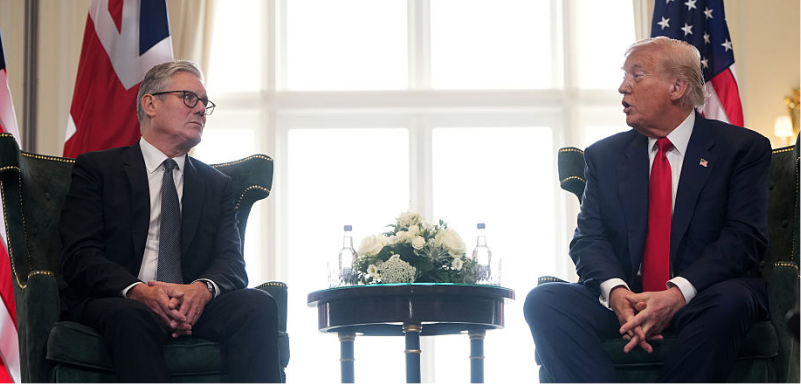The US has warned the UK that the enforcement of so-called “buffer zones” around abortion clinics and facilities puts the “shared values” of the two countries at risk.
The censure by the US state department comes just over a week after its annual Human Rights Report accused Britain of “serious restrictions on free speech”, reports the Daily Telegraph.
Last year in England and Wales, a new law came in that means people face unlimited fines if they engage in silent prayer or protest within 150 metres of a clinic or hospital providing abortion services.
As a result, a number of people, most of them Christian pro-life activists, have been charged under the new law, including for silent prayer.
During these incidents, the US said it was monitoring the situation and emphasised the importance of free speech and religious liberty.
The US state department has now gone further, accusing Downing Street of an “egregious violation of the fundamental right to free speech”, the Telegraph reports.
A spokesperson for the department said: “The United States is still monitoring many ‘buffer zone’ cases in the UK, as well as other acts of censorship throughout Europe.”
The spokesperson added: “The UK’s persecution of silent prayer represents not only an egregious violation of the fundamental right to free speech and religious liberty, but also a concerning departure from the shared values that ought to underpin US-UK relations.
“It is common sense that standing silently and offering consensual conversation does not constitute harm.”
The statement is the latest warning to come from the White House about free speech in the UK.
In the latest edition of its annual Human Rights Report, published last week, the US state department claimed there were “credible reports of serious restrictions on freedom of expression”.
JD Vance, the US vice-president, used his keynote speech at the Munich Security Conference in February to warn that free speech was “in retreat” in Britain.
Mr Vance then confronted Sir Keir Starmer over the issue during the Prime Minister’s visit to the White House that same month.
US officials are understood to have contacted a pro-life Christian charity earlier this year asking to speak to campaigners who have suffered from “censorship” of their views, reports the Telegraph.
These include Ms Tossici-Bolt, a retired NHS medical scientist who has lived in the UK for 35 years.
Ms Tossici-Bolt was handed a two-year conditional discharge and ordered to pay £20,026 in costs for standing outside a clinic holding a sign that read: “Here to talk if you want to.”
She described the verdict against her as “a dark day for Great Britain” and said that her prosecution under buffer-zone laws was just one example of an “Orwellian” erosion of free speech in Britain.
The Telegraph reports that when asked why she rejects the view that women’s right to private abortion access outweighs protest rights, Ms Tossici-Bolt said that “pro-life volunteers” are wrongly labelled as protesters.
In Scotland, the country’s prosecution service has announced that it will take no further action against a 75-year-old woman who became the first person charged under a new Scottish “buffer zone” law.
Rose Docherty was arrested in February outside Glasgow’s Queen Elizabeth University Hospital while standing with a sign reading: “Coercion is a crime, here to talk, only if you want.”
Though she was charged under Scotland’s Abortion Services (Safe Access Zones) (Scotland) Act, the Crown Office and Procurator Fiscal Service (COPFS) confirmed it would not pursue the case.
The US administration of President Donald Trump has applauded the Scottish prosecutor service’s decision to clear the 75-year-old pro-life campaigner over her silent protest.
The initial arrest of Ms Docherty earlier this year caught the attention of the Trump administration at the time, and she was visited by White House officials a month after her arrest.
After the visit, Ms Docherty commented that it was “heartening that others around the world, including the US government, have realised this injustice and voiced their support”.
Scotland’s 200-metre “safe access zones” took legal effect on 24 September 2024. By contrast, England and Wales operate 150-metre zones under the Public Order Act 2023 (that commenced 31 October 2024), while Northern Ireland sets zones of 100 metres that may be extended up to 250 metres.
Advocates of Scotland’s 200-metre exclusion zones insist they are designed to shield women from harassment and intimidation. Yet the first test case did not involve placards with graphic imagery, loud confrontation or organised demonstrations. It involved a 75-year-old woman quietly holding a sign with a simple message.
Critics of the new Scottish law note that the contrast between the legislative intent and the reality of Docherty’s conduct raises serious questions about whether the law is proportionate and whether it risks criminalising forms of expression that are both peaceful and unobtrusive.
They have also pointed out that, as in England, police already have powers to act against harassment, without the need for new legislation that risks silencing speech altogether.
Photo: US President Donald Trump meets with British Prime Minister Keir Starmer at Trump Turnberry golf club during a brief visit by the US president to Scotland from July 25 to 29, Turnberry, Scotland, 28 July 2025. (Photo by Christopher Furlong/Getty Images.)
